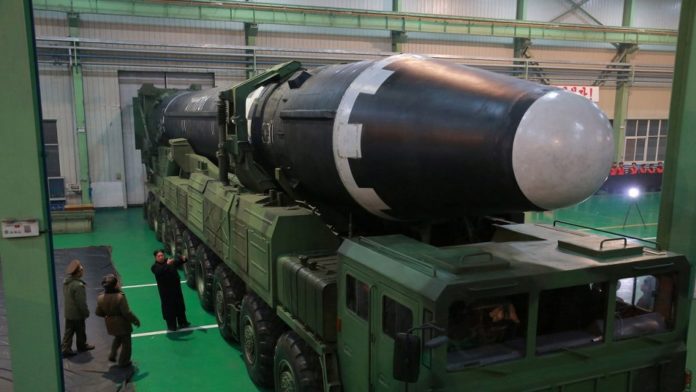This article was originally published by 1945.
On 30 January Kim Jong-un conducted another test launch of what is suspected to be an intermediate-range ballistic missile. This is the seventh event of 2022. With his recent statements implying he is considering ending his self-imposed moratorium on ICBM and nuclear tests, it appears Kim is doubling down on his political warfare and blackmail diplomacy strategy while he simultaneously works to increase his warfighting capabilities. Kim continues to seek his short-term objective of coercing the U.S. and UN into providing sanctions relief, his intermediate objective of driving a wedge in the ROK/U.S. alliance, and his long-term objective of seeking to dominate the Korean peninsula.
It is possible that Kim will continue to escalate his tests in the near to mid-term from the Lunar New Year holiday on 1 February to the birthdays of Kim Jong-il (16 February) and Kim Il-sung (15 April) among other upcoming important dates. He is likely escalating because he is not successfully coercing the ROK, the U.S., and the international community into providing concessions. However, if nations decide to appease him it is very likely that he will judge his strategy as a success and continue to execute from the seven decades old Kim family regime playbook that calls for increased tensions, threats, and provocations to gain political and economic concessions.
Policymakers and strategists continue to be at a loss as to how to stabilize the Korean situation. The proposed courses of action range from military demonstrations to actual operations to a return to “sunshine-like“ policies of twenty years ago. However, there is one course of action that has never been executed with anything more than halfhearted efforts and lip service. While there have been attempts at maximum pressure and maximum engagement neither has employed a holistic, synchronized, and comprehensive information and influence campaign to shape the decision-making, behavior, and attitudes of the elite, the second tier and military leadership, and the Korean people in the North. The U.S. and the ROK/U.S. alliance has never been willing to “lead with influence,” employing sophisticated and well-orchestrated activities to influence multiple target audiences.
While external pressure is important, it is not sufficient to force Kim to change his calculus. The only way he will change course is if he feels internal pressure from the elite and military leadership and they collectively force him to negotiate an end to the nuclear and missile programs in return for the resources necessary for their survival. They must understand their current path is destined to fail and that they must convince Kim to negotiate.
It is assumed they understand this based on the actions of the international community (e.g., sanctions and military readiness of the ROK/U.S. alliance). Unfortunately, life-long indoctrination, the system of social control, and the Propaganda and Agitation Department’s around-the-clock propaganda have been effective in preventing leaders from correctly interpreting the intent and the actions of the ROK, the U.S., and the international community. There has been no effort to compete with the diabolical North Korean social control system and propaganda efforts for the past seven decades.
This has long been an unfortunate missed opportunity because external information is an existential threat to the Kim family regime. This is why Kim Yo-jong coerced the ROK into passing the anti-leaflet law in December 2020 by threatening and then actually destroying the ROK liaison building in Kaesong. Escapees/defectors from the North have been working diligently for years to try to send information into the north and expose the people to the outside work. As Dr. Jung Pak has often asked, who does Kim fear more: The U.S. or the Korean people in the North? The fact is it is the people armed with information about the outside world and South Korea in particular.
The U.S. must take the lead in establishing an aggressive information and influence activities campaign. This is problematic given the view of the current South Korean administration which seeks to engage the regime and refrain from “upsetting” it as evidenced by the anti-leaflet law.But the U.S. and the international community can no longer wait for the ROK to get on board though perhaps the next president will understand the nature, objectives, and strategy of the regime and be willing to partner on an influence campaign. After all, South Korea is the key to any successful outcome on the Korean peninsula.
A comprehensive plan requires nation-level planning, organization, and execution. It will require national leadership to make this a priority, but it should not be feared as resource-intensive or expensive. A wide range of tools, processes, capabilities, and platforms are already in place. They need to be harnessed, synchronized, and employed to meet the influence objectives.
To read more, please click here.
David Maxwell is a senior fellow at FDD. He is a 30-year veteran of the United States Army, retiring in 2011 as a Special Forces Colonel with his final assignment serving on the military faculty teaching national security strategy at the National War College.



